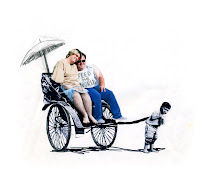Statements can be either descriptive or prescriptive. That is, they can either assert a particular perspective on the way the world is with varying degrees of limitations, or constraints - in short, a definition of what the world is, based mainly on the scope of the subject lens (e.g. individual or community, which are also of course subject to definition) Alternatively, a declarative statement asserts that a particular course of action is the right one, it applies previously-concluded abstract rules to a real-world problem (1). This is done through an assimilation of the issues into a coherent view (in the particular thinker's opinion, of course) through prioritization. This prioritization reflects the individual's value hierarchy, whose genealogy in turn reflects both degrees of dogmatism and reflection. It is this mixture that this magazine intends to address.
This magazine is concerned with the primordial questions: what is a human life and what is to be done? The Human Lobby does not purport to exist simply as a meeting of the minds venue (2). Though this locus consensio is a fundamental goal, the overriding standard at work, running throughout is pragmatism. If there is not a direct correspondence to the real world, then we're not interested in it as an abstract notion. We are not interested in conflating this modern notion of bipartisanship with agreement. Bipartisanship in American politics could refer to our one party corporate state, but I'm invoking it here as an example of our sick culture and as anything but agreement or compromise. Democratic legislative initiatives require Republican support almost universally. So in order to garner support, the product includes both the initiatives of Republicans and Democrats. This causes a schizophrenic society where tensiosn build up around the different courses of action dictated by each bill. I do not intend to argue here that a single ideology is the answer. I'd like to end ideology as it currently exists in its dogmatic, entrenched turret.
As such, we are concerned only with ideas that bear directly and most presciently upon the most important question facing human beings: what is the best human life and how is it best achieved?
(1) [the age of the conclusion does not bear directly on whether the conclusion is dogmatically followed or constantly calibrated and adjusted, prone to radical ideological under the proper skies of justification (not necessarily limited to those evidentiary means flowing from the purely rational faculty, which seems indeed to be a myth.)]
(2) or as a repository for mental masturbation in any way
"in the poetry of the poet and in the thinking of the thinker, there is always so much worldspace to share that each and every thing - a tree, a mountain, a house, the call of a bird - completely loses its indifference and familiarity." - martin heidegger
Subscribe to:
Post Comments (Atom)
i, i, i

- steven
- "Seeing that before long I must confront humanity with the most difficult demand ever made of it, it seems indispensable to me to say who I am. Really, one should know it, for I have not left myself "without testimony." But the disproportion between the greatness of my task and the smallness of my contemporaries has found expression in the fact that one has neither heard nor even seen me. I live on my own credit; is it perhaps a mere prejudice that I live? ... I need only to speak with one of the "educated" who come to the Upper Engadine for the summer, and I am convinced that I do not live ... Under these circumstances I have a duty against which my habits, even more the pride of my instincts, revolt at bottom, namely, to say: Hear me! For I am such and such a person. Above all, do not mistake me for someone else!" - Nietzsche, Ecce Homo
No comments:
Post a Comment